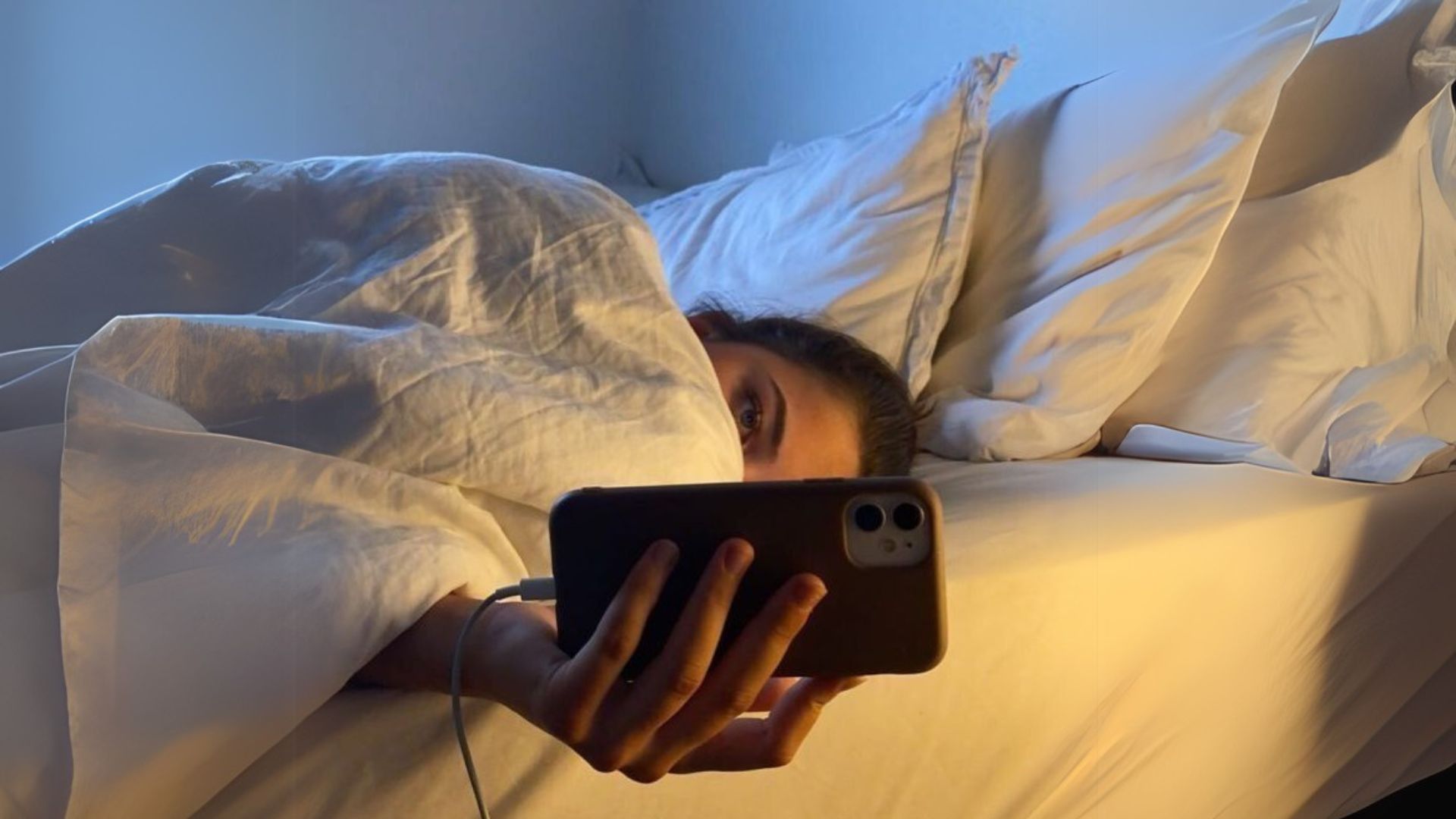Did you know that studies show over 60% of school-aged children don’t get the recommended amount of sleep each night? Despite the growing awareness of the importance of sleep, many children still struggle to get the 9 to 11 hours of rest they need.
This issue is not just about kids feeling tired during the day—it has serious, often overlooked consequences for their mental health. Sleep deprivation in children is often brushed aside as a minor inconvenience, but its effects extend far beyond fatigue.
It disrupts brain function, emotional regulation, and can lead to serious long-term mental health challenges, including anxiety, depression, and behavioral problems.
The impact of poor sleep on children’s mental well-being is often hidden. Parents and teachers may notice signs of irritability or difficulty concentrating, but they may not connect these behaviors with sleep deprivation.
In fact, research shows that sleep deprivation in children often manifests as behavioral issues rather than overt signs of tiredness. For example, a child who is chronically sleep-deprived may become overly emotional, prone to outbursts, or have trouble maintaining positive relationships with peers.
These are often mistaken for signs of a behavioral disorder, when in reality, the root cause could be something as simple—and as treatable—as poor sleep hygiene.
Why should parents and teachers care about this connection? Understanding the relationship between sleep and mental health is essential for fostering a supportive environment where children can thrive.
When children aren’t getting enough sleep, their cognitive abilities are hindered—they struggle with memory, concentration, and decision-making, which directly impacts their performance in school and their ability to interact socially.
Additionally, sleep deprivation impairs emotional regulation, making it more difficult for kids to cope with stress. This can lead to heightened feelings of anxiety and depression, which further contribute to a cycle of poor sleep, worsened mental health, and academic struggles.
This article will explore how sleep deprivation is linked to children’s mental health, the hidden effects it has on their emotional and cognitive development, and the practical steps that can be taken by both parents and teachers to address this pressing issue.
Understanding and tackling sleep deprivation is not just about making sure kids get enough rest—it’s about ensuring that they are mentally healthy, emotionally resilient, and prepared to succeed in life.
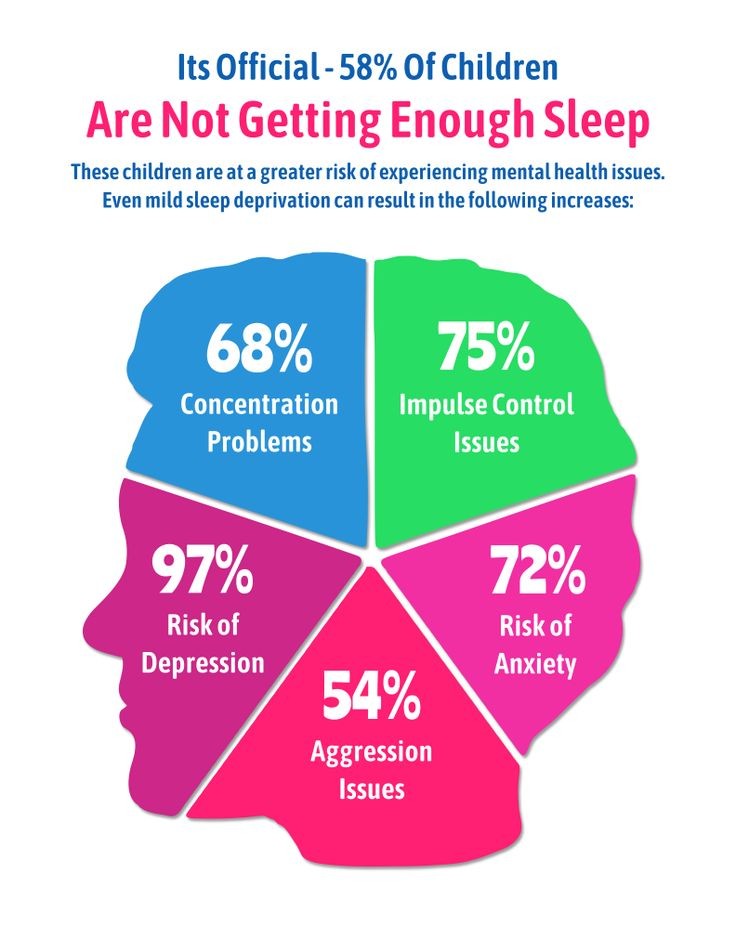
Sleep deprivation affects 58% of children, increasing their risk of mental health issues. It leads to higher rates of depression (97%), anxiety (72%), and concentration problems (68%).
Understanding Sleep and Its Role in Mental Health
Sleep is more than just a time for rest; it’s an essential process that allows the brain and body to regenerate, consolidate memories, and regulate emotions. When a child sleeps, their brain moves through various stages of rest, each serving a different function.
The two primary stages of sleep—REM (Rapid Eye Movement) and non-REM sleep—are critical to their cognitive and emotional development.Non-REM sleep is broken down into three stages, each progressively deeper than the last.
In the deepest stages of non-REM sleep, the body undergoes physical restoration: cells repair themselves, and energy is replenished. During these phases, the brain also performs a crucial task—memory consolidation.
Studies have shown that deep sleep (stages 3 and 4) allows the brain to sift through the day’s experiences, transferring information from short-term to long-term memory. This is why children who don’t get enough deep sleep may struggle with recall, concentration, and academic performance.
REM sleep, the stage most associated with dreaming, is essential for emotional regulation and cognitive processes such as learning and problem-solving. It is during REM sleep that the brain processes emotions and integrates them with past experiences.
When children are deprived of REM sleep, they often exhibit heightened emotional responses, difficulty managing stress, and an increase in anxiety or irritability. REM sleep is also vital for creative thinking and the ability to solve problems, which are critical skills in both school and social environments.
The relationship between sleep and mental health is undeniable. Adequate sleep is foundational to a child’s ability to regulate their emotions. Children who consistently get poor sleep often struggle with emotional dysregulation, leading to heightened stress and mood disorders.
Research indicates that insufficient sleep can lead to irritability, aggression, and difficulty coping with frustration, all of which are linked to the development of anxiety and depression in children. A lack of sleep can make even minor stressors feel overwhelming, further contributing to mental health challenges. Age-specific sleep needs are another important consideration.
The National Sleep Foundation recommends that toddlers (1-2 years old) get between 11-14 hours of sleep, school-age children (6-13 years old) should aim for 9-11 hours, and teenagers (14-17 years old) need 8-10 hours. When children consistently fall short of these recommendations, their mental health can suffer.
For example, a 10-year-old who only gets 7 hours of sleep may experience a decline in their ability to concentrate and regulate emotions the next day. Over time, sleep deprivation can impair their cognitive abilities, contributing to poor academic performance, social withdrawal, and increased anxiety.
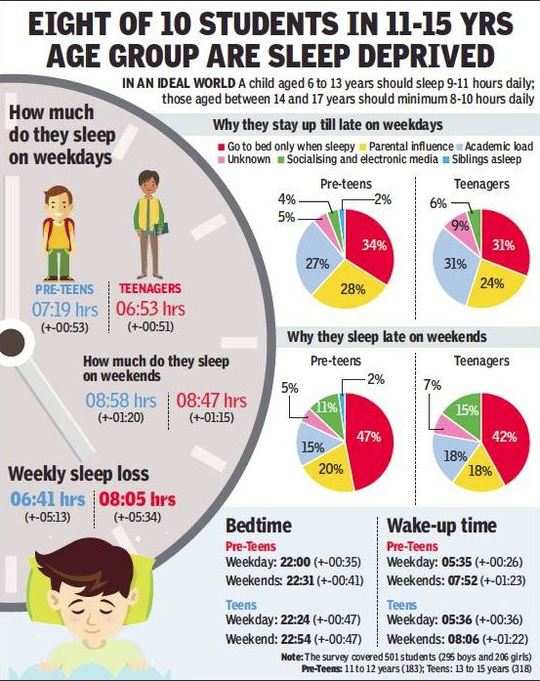
Eight out of ten students aged 11-15 are sleep-deprived, getting less than the recommended 9-11 hours. Academic load and social media are major reasons for their late sleep on both weekdays and weekends.
In sum, sleep is an indispensable part of a child’s mental and emotional health. It is during sleep that the brain performs critical functions such as emotional processing, memory consolidation, and cognitive restoration. Parents and teachers need to recognize the signs of sleep deprivation and its impact on mental health to help children thrive both academically and emotionally.
Sleep Deprivation: What Does It Look Like?
Sleep deprivation is a growing concern among children, often affecting their physical, emotional, and cognitive health in ways that aren’t immediately obvious. While many might assume that sleep problems are a matter of kids simply staying up too late, the reality is much more complex.
There are several factors that contribute to children not getting enough sleep, and these issues can manifest in various ways that parents and teachers may overlook. One of the leading causes of sleep deprivation is screen time. With the rise of smartphones, tablets, and computers, children are exposed to digital devices more than ever before.
Studies show that exposure to blue light from screens interferes with the production of melatonin, the hormone that regulates sleep. When children are allowed to use these devices late into the evening, it can delay their ability to fall asleep and disrupt their natural sleep cycle.
Additionally, academic pressure plays a significant role in sleep deprivation. As children progress through school, the demands of homework, projects, and extracurricular activities increase. Many children find themselves staying up late to complete assignments or study for exams, sacrificing valuable rest in the process.
Extracurricular activities are also a contributor, as after-school commitments like sports, music, and social events can push bedtimes later and later, leaving children with insufficient sleep.
Finally, family dynamics, such as inconsistent bedtimes or a lack of structured routines, can exacerbate sleep deprivation. When children’s sleep schedules aren’t prioritized or regular, they may find themselves going to bed later than they should, which disrupts their overall sleep quality.
The signs of sleep deprivation in children are often subtle, but they are not hard to spot once you know what to look for. Irritability is one of the most common symptoms—children who aren’t getting enough sleep tend to be more easily frustrated or upset, often over minor issues.
This irritability is closely linked to emotional dysregulation, as the lack of sleep makes it harder for children to manage their feelings. Difficulty concentrating is another telltale sign.
Sleep-deprived children may struggle to focus on tasks, leading to a decrease in school performance. This lack of focus can also manifest in forgetfulness, as children may have trouble remembering instructions or completing assignments.
Mood swings are common as well. Children may shift quickly between being overly energetic and withdrawn, often showing signs of anxiety or depression. These emotional changes are linked to the disruption of the brain’s ability to process and regulate emotions during sleep.
Lastly, poor academic performance often follows when children are not getting the recommended amount of rest. Studies have shown that kids who consistently get less sleep tend to score lower on tests and show a decrease in their ability to retain new information.

According to the Centers for Disease Control and Prevention (CDC), about 70% of school-aged children fail to get the recommended 9-11 hours of sleep each night. Furthermore, the National Institutes of Health (NIH) has reported that children who are chronically sleep-deprived are at a higher risk of developing mental health issues, such as anxiety and depression.
Research has also linked sleep deprivation to behavioral problems, like impulsivity and poor decision-making. These statistics underscore the fact that sleep deprivation in children is not a minor issue but a widespread problem that affects a significant portion of the population.
In conclusion, sleep deprivation in children is a multifaceted issue with many causes, from excessive screen time to academic pressures. Its effects are not always obvious, but they can have a profound impact on a child’s emotional well-being, cognitive function, and overall health.
By understanding the signs of sleep deprivation and its underlying causes, parents and teachers can take the necessary steps to help children develop better sleep habits and improve their mental well-being.
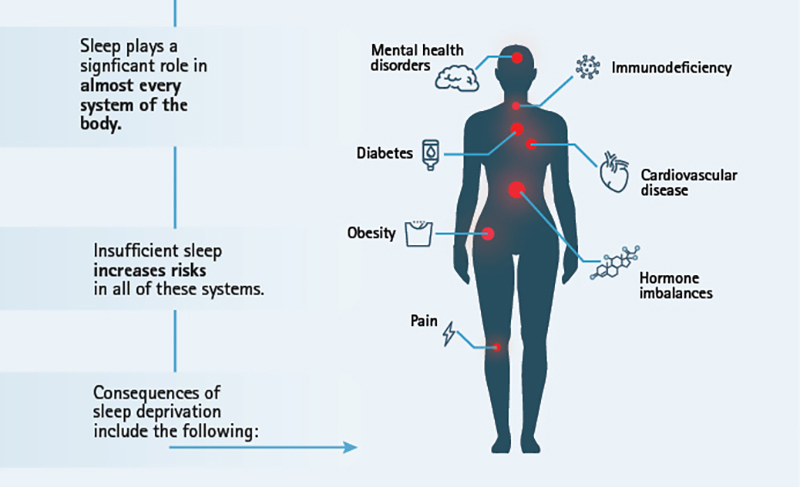
Sleep deprivation affects nearly every system in the body, increasing risks of mental health disorders, diabetes, and cardiovascular disease. It also weakens immunity, disrupts hormones, and contributes to obesity and chronic pain.
The Hidden Psychological Effects of Sleep Deprivation on Kids
The consequences of sleep deprivation in children are more profound than many may realize, affecting not just physical health, but also cognitive functioning and emotional well-being. Sleep is crucial for a child’s development, and when it’s cut short, the psychological effects are both immediate and long-lasting.
One of the primary cognitive effects of inadequate sleep is difficulty with attention and memory. Studies have shown that sleep-deprived children experience significant problems with concentration and learning retention.
For instance, a study published in Sleep Medicine Reviews found that children who consistently sleep fewer than the recommended hours show poorer comprehension in academic tasks, struggle to recall learned material, and perform worse on standardized tests.
Sleep is essential for memory consolidation, the process by which the brain stores and organizes information from the day. Without sufficient sleep, this process is disrupted, leading to difficulties in remembering and applying knowledge in school settings.
Attention span also suffers, meaning that children find it harder to focus on tasks, follow instructions, and complete assignments. These cognitive challenges often spill over into poor performance in school, which can create a cycle of academic frustration and even exacerbate feelings of low self-esteem.
Beyond cognitive difficulties, sleep deprivation also affects behavioral regulation. Research has found that children who do not get enough sleep are more prone to impulsive behavior and poor decision-making.
Lack of sleep impacts the brain’s prefrontal cortex, the area responsible for executive functions like judgment and impulse control. When children are sleep-deprived, they struggle with thinking before acting, often making rash decisions or acting out of frustration.
This can result in problematic behaviors both at home and in school, such as outbursts, arguments with peers, or even engaging in risky activities. A study from the University of California found that sleep-deprived adolescents exhibited a significant increase in impulsive behaviors, a finding that can be particularly concerning in an era of digital distractions and peer pressure.
In addition to cognitive and behavioral difficulties, sleep deprivation can have a major impact on a child’s emotional health. Children who don’t get enough sleep are more likely to experience emotional dysregulation, which can lead to increased irritability and mood swings.
A lack of sleep makes it harder for children to manage their emotions, and even small frustrations can trigger intense reactions. This emotional volatility can result in aggressive outbursts, crying spells, or sudden anger, which can disrupt both family dynamics and peer relationships.
A study published in the Journal of Clinical Child and Adolescent Psychology found that children who sleep less than 8 hours a night are more likely to exhibit higher levels of anxiety and depression.
Sleep deprivation significantly affects the amygdala, the part of the brain responsible for processing emotions, heightening sensitivity to stress and negative emotions. This is particularly troubling as children who are sleep-deprived are at a much higher risk of developing long-term mental health issues.
Moreover, sleep deprivation can have far-reaching social consequences. Children who lack sleep often find it difficult to connect with their peers. Their emotional instability can cause them to withdraw from social activities, develop fewer friendships, and isolate themselves from others.
When children are constantly tired, they may lack the energy and social skills needed to engage in group activities or simply have fun. The resulting social withdrawal can further deepen their feelings of loneliness and exacerbate their mood disorders, creating a cycle that is hard to break.
Perhaps one of the most concerning effects of sleep deprivation is its impact on emotional resilience. Research has shown that sleep is crucial for helping children bounce back from setbacks and cope with stress. Without adequate sleep, children struggle to manage frustration and recover from emotional challenges.
A study published in Psychological Science found that children who experience chronic sleep deprivation show signs of lower emotional resilience, making it harder for them to cope with daily stressors like academic challenges, conflicts with peers, or family issues. They may have difficulty using problem-solving skills, often feeling overwhelmed instead of empowered.
This lack of resilience can have long-term implications for mental health, leading to more serious emotional difficulties as children grow.
In conclusion, the psychological effects of sleep deprivation on children extend far beyond simple tiredness. Sleep impacts not only their cognitive abilities but also their emotional stability and social functioning. By understanding these hidden effects, parents, teachers, and caregivers can take proactive steps to prioritize sleep and help children build healthier habits that will support their mental well-being in the long run.
Sleep Deprivation and Mental Health Disorders: A Vicious Cycle
Sleep deprivation and mental health disorders in children are intricately connected, creating a vicious cycle that can have long-lasting effects on their well-being. Research shows that insufficient sleep not only increases the risk of developing mental health issues such as anxiety and depression, but these conditions can, in turn, worsen sleep deprivation, making it even harder for children to get the rest they need.
The relationship between sleep deprivation and mental health disorders is a two-way street. Studies have demonstrated that children who consistently fail to get enough sleep are at a significantly higher risk of developing anxiety and depression.
For example, a study published in the Journal of Youth and Adolescence found that sleep-deprived children exhibited increased feelings of anxiety and sadness, which is linked to changes in brain chemistry and heightened stress responses.
When children don’t sleep well, their brains struggle to process emotions, which contributes to feelings of fear, worry, or sadness. These emotional struggles make it difficult for kids to cope with daily stressors, which only intensifies the emotional strain and further disrupts their sleep.
But the cycle doesn’t stop there. Mental health issues like anxiety and depression can significantly impact a child’s ability to fall asleep or stay asleep. Children with anxiety may lie awake worrying about events, school, or relationships, making it nearly impossible for them to relax enough to fall asleep.
Similarly, children suffering from depression may feel hopeless, disinterested, or too fatigued to engage in normal daily activities, which can disturb their sleep patterns.
In fact, research from the National Sleep Foundation indicates that anxiety and depression are strongly correlated with sleep problems, including insomnia and frequent night wakings. The more children struggle with emotional and mental health issues, the more difficult it becomes for them to rest and recharge.
The feedback loop between sleep deprivation and mental health struggles only worsens over time. As sleep deprivation takes a toll on cognitive and emotional functioning, children are less equipped to cope with stress and more vulnerable to developing further mental health challenges. This leads to a cascade of issues: poor academic performance, strained relationships with peers, and even increased aggression or withdrawal.
Inadequate sleep further weakens a child’s resilience, preventing them from handling emotional stress in a healthy way.
To break this cycle, teachers and parents have a crucial role to play. For parents, setting a consistent bedtime routine and creating a calming sleep environment can significantly improve a child’s chances of getting the sleep they need. Parents should also watch for signs of anxiety or depression, such as changes in behavior, mood, or social withdrawal, and seek professional support when necessary.
For teachers, understanding the impact of sleep deprivation on emotional and academic performance is vital. Teachers can support sleep health by fostering a low-stress classroom environment, encouraging open communication, and giving children strategies to cope with stress.
Research has shown that early intervention can make a substantial difference in breaking the vicious cycle of sleep deprivation and mental health disorders. For example, a study published in Sleep Health found that children who received sleep interventions—including sleep hygiene education and stress management strategies—showed improvements not only in their sleep patterns but also in their mood and school performance.
By addressing sleep issues early on and helping children build healthier habits, parents and teachers can create a positive environment where children feel both emotionally supported and well-rested.
In conclusion, the connection between sleep deprivation and mental health disorders in children is complex, yet undeniable. The effects of poor sleep can contribute to anxiety, depression, and other emotional issues, which in turn make it even harder for children to sleep.
By recognizing and addressing this cycle, parents and teachers can play an active role in supporting children’s mental health and ensuring they get the sleep they need for optimal development.
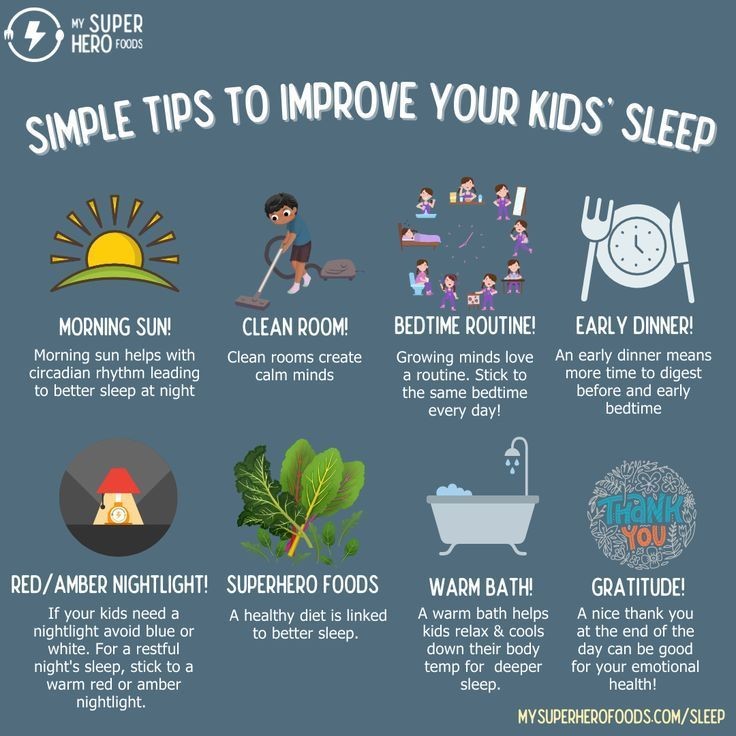
Simple habits like morning sunlight, a bedtime routine, and a clean room can improve children’s sleep quality. A healthy diet, warm baths, and gratitude practices also contribute to deeper and more restful sleep.
Long-Term Mental Health Risks
The long-term effects of chronic sleep deprivation in childhood extend well beyond academic struggles and social difficulties—they can also significantly impact mental health well into adolescence and adulthood.
Research consistently shows that children who regularly miss out on proper sleep face an increased risk of developing serious mental health disorders later in life, including anxiety, depression, and even early-onset mood disorders.
Studies following children into their teenage years and adulthood have uncovered a clear link between early sleep deprivation and persistent mental health issues. A notable study conducted by the University of California, Berkeley tracked children into adolescence and found that those who had poor sleep habits during childhood were more likely to experience chronic anxiety and depression as teens.
Sleep deprivation disrupts the brain’s ability to regulate emotions, making it harder for children to cope with stress and increasing the likelihood of emotional imbalances. This link between sleep deprivation and mental health problems is compounded over time.
The more chronic sleep disruptions children face, the greater their vulnerability to developing mood disorders in adulthood. Sleep is essential for emotional resilience, and without it, the ability to cope with life’s challenges diminishes, setting the stage for long-term psychological struggles.
Practical Solutions for Parents and Teachers
Creating a sleep-friendly environment both at home and at school is crucial for ensuring children get the quality rest they need for mental and physical well-being. At home, the environment plays a major role in how well children sleep.
Research from the National Sleep Foundation indicates that a quiet, dark, and cool environment is optimal for sleep. Parents should consider reducing noise levels at night, dimming the lights an hour before bedtime, and setting the thermostat to a comfortable temperature, typically between 60 to 67°F. These steps help signal to the child’s body that it’s time to wind down, promoting deeper and more restorative sleep.
Moreover, limiting distractions, such as TVs or phones, can help children stay focused on the task of falling asleep.
At school, creating a supportive environment for sleep also holds significant value. Schools can help by starting the school day later, especially for older children, as research suggests that adolescents, in particular, experience a natural shift in their sleep-wake cycle.
A study from Harvard Medical School found that delaying school start times by even 30 minutes led to significant improvements in students’ sleep duration and overall mood. Furthermore, educating children about the importance of sleep and encouraging short naps during the day can also help mitigate the effects of sleep deprivation.
Together, parents and teachers can play a vital role in shaping environments that prioritize sleep, ensuring that children develop healthy sleep habits from an early age.
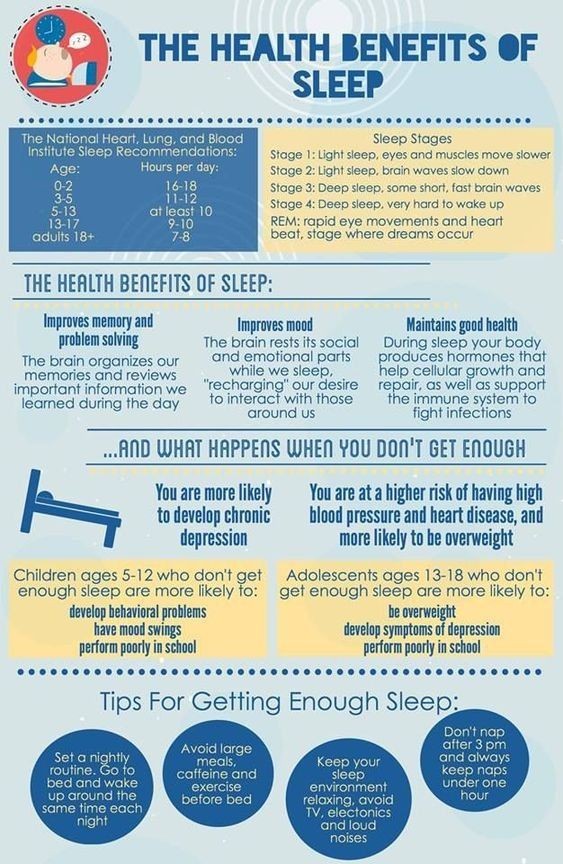
Adequate sleep improves memory, mood, and overall health, while lack of sleep increases the risk of depression, obesity, and poor academic performance. Following healthy sleep habits, like maintaining a consistent bedtime and avoiding caffeine, can promote better rest.
Restoring Balance: The Power of Sleep in Supporting Children’s Mental Health and Well-being
Sleep deprivation in children is a hidden but deeply impactful issue, with significant psychological, emotional, and social consequences. From impaired cognitive function and emotional dysregulation to long-term risks of developing anxiety, depression, and academic challenges, the effects of poor sleep can ripple across all areas of a child’s life.
The connection between sleep and mental health is undeniable; when children are deprived of sleep, their ability to concentrate, regulate emotions, and interact socially is compromised. Over time, this can lead to a cycle of frustration, stress, and worsening mental health.
However, there is hope. Parents and teachers can play a critical role in reversing the damage caused by sleep deprivation by working together to foster healthier sleep habits. Recognizing the signs of sleep deprivation early and taking steps to address them—whether through a consistent bedtime routine, creating a calm and conducive sleep environment, or adjusting academic pressures—can help children regain their well-being.
Small changes, like reducing screen time before bed or encouraging physical activity, can lead to significant improvements in both mental health and academic performance. By prioritizing sleep, we can unlock the potential for improved emotional resilience, better academic outcomes, and stronger social connections.
With the right support and guidance, children can experience the full benefits of restorative sleep, leading to a brighter, more balanced future.
FAQs on The Hidden Effects of Sleep Deprivation on Kids’ Mental Well-being
What are the main effects of sleep deprivation on children’s mental health? Sleep deprivation can lead to cognitive difficulties, emotional dysregulation, mood swings, and higher risk for developing anxiety and depression.
How much sleep should children get each night? Children aged 6-12 should get 9-12 hours of sleep, while teenagers (13-18) need 8-10 hours for optimal mental health and well-being.
What is the relationship between sleep and mental health in children? Sleep is essential for emotional regulation, cognitive function, and overall well-being. Lack of sleep can exacerbate mental health issues like anxiety and depression.
Can sleep deprivation affect a child’s academic performance? Yes, sleep deprivation impacts attention, memory, and decision-making, which can result in poor academic performance.
How does sleep deprivation contribute to mood swings in children? Lack of sleep disrupts the brain’s ability to regulate emotions, making children more prone to irritability, frustration, and mood swings.
Are there long-term mental health risks associated with chronic sleep deprivation? Yes, chronic sleep deprivation increases the risk of developing mental health disorders like depression, anxiety, and mood disorders later in life.
How does sleep deprivation impact social behavior in children? Sleep-deprived children may experience social withdrawal, difficulty making friends, and issues with maintaining relationships due to emotional and behavioral struggles.
What role do parents and teachers play in helping children get better sleep? Parents and teachers can support healthy sleep by establishing consistent bedtime routines, creating sleep-friendly environments, and addressing sleep-related stressors.
What is the impact of screen time on children’s sleep patterns? Excessive screen time, especially before bed, interferes with the body’s natural sleep-wake cycle, making it harder for children to fall asleep and get quality rest.
How can teachers and parents work together to ensure children get enough sleep? Parents and teachers can collaborate on setting appropriate bedtimes, adjusting homework loads, and promoting physical activity to encourage better sleep habits.
What are some practical tips for creating a sleep-friendly environment at home? Ensuring the bedroom is quiet, dark, and cool, limiting distractions like screens, and maintaining a regular sleep schedule are key strategies for better sleep at home.
Can schools help improve children’s sleep patterns? Yes, schools can help by starting the day later, educating students about the importance of sleep, and allowing short naps during the day if necessary.
How does sleep deprivation affect a child’s ability to concentrate? Lack of sleep impairs cognitive functions like concentration and memory retention, making it difficult for children to focus on tasks or absorb information.
What are some signs that a child may be sleep-deprived? Signs include irritability, difficulty concentrating, mood swings, poor academic performance, and physical symptoms like yawning or falling asleep in class.
What is the connection between sleep deprivation and anxiety in children? Sleep deprivation can exacerbate anxiety by impairing emotional regulation and making it harder for children to manage stress and negative emotions.
How does chronic sleep deprivation affect a child’s decision-making? Sleep deprivation can lead to impulsivity and poor decision-making, as the brain struggles to process information and regulate emotions properly.
What role does physical activity play in improving sleep for children? Regular physical activity can help regulate sleep patterns and improve the quality of sleep, making it easier for children to fall asleep and stay asleep.
How can parents help manage their child’s stress to improve sleep? Parents can help by teaching stress-management techniques, such as mindfulness, relaxation exercises, or deep breathing, and creating a calming bedtime routine.
What are the benefits of modeling good sleep habits as a parent or teacher? Children are more likely to adopt healthy sleep behaviors when they see parents and teachers prioritizing sleep and following consistent routines themselves.
Can small changes in sleep habits really make a difference in a child’s mental health? Yes, even small adjustments like setting a regular bedtime, reducing screen time, and ensuring a calm sleep environment can significantly improve a child’s mental well-being and academic performance.

